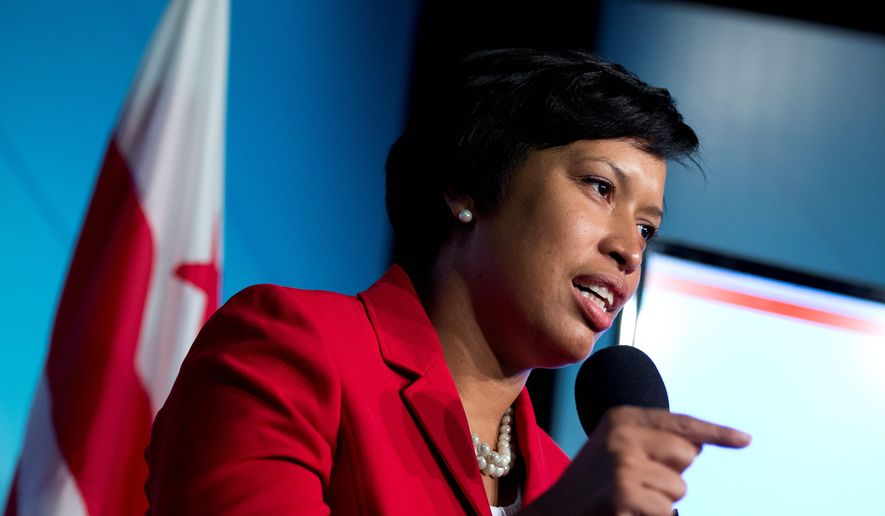The D.C. Council approved Wednesday a nearly $13 billion budget after ironing out disagreements between proposals from the mayor and the council chairman — scrapping tax increases while keeping a promise to invest more than $100 million into affordable housing initiatives.
At the same time the 13-member council met to vote on the largest budget in the city’s history, the U.S. Court of Appeals for the District of Columbia rendered a decision that could end up freeing the District from an obligation to obtain congressional approval before spending its local tax dollars. The court vacated a ruling that determined that the city’s Budget Autonomy Act was not legally enacted by the council and remanded the case back to D.C. Superior Court.
Although city lawmakers heralded the decision as a victory, council Chairman Phil Mendelson said he would proceed cautiously with the fiscal 2016 budget and seek clarification from the city’s chief financial officer, Jeffrey S. DeWitt.
“This was a good result, but this is not a final result,” said Mr. Mendelson, a Democrat. “There is some uncertainty. As we’re considering the budget, we’re told the process has changed.”
A spokesman for Mr. DeWitt, who does not believe the city has the legal authority to bypass congressional approval of the budget, said that if a court decides the act is legal, “he will happily comply.”
While the matter remains unresolved, the council must vote June 16 on a supplemental Budget Support Act.
The $12.9 billion budget adopted by the council Wednesday makes “enormous strides” by funding a number of initiatives focused on lowering burdens on lower- and middle-income residents, reducing homelessness and prioritizing school modernization projects efficiently, Mr. Mendelson said.
The council tussled with Mayor Muriel Bowser over several of her priorities, including the issuance of body cameras to police officers and an expansion of a summer jobs program to include adults up to age 24.
In the end, the council approved an allotment of 1,600 body cameras rather than the 2,400 initially sought by the Metropolitan Police Department. Council Chairman Pro Tempore Kenyan McDuffie, a Democrat, raised concern about the department’s stance on curtailing public access to videos from the cameras.
Although the Summer Youth Employment Program, which provides teenagers and young adults with six-week summer jobs, will include 22- to 24-year-olds this year, the council declined to extend the program to that age group next year. Members questioned whether the jobs provide any meaningful help to individuals seeking permanent employment.
Council member Vincent Orange, at-large Democrat, announced from the dais that members had an understanding that if 35 percent of those youths secure permanent jobs after this summer’s work ends, the council will renew the expansion of the program next year.
Mr. Mendelson said there was no such deal but encouraged supporters of the program to document successes.
“Prove us wrong this year and make us reconsider,” he said.
Ms. Bowser noted that she did not support budget initiatives such as expanding the time that motorists are required pay for parking and increasing the fine for an expired parking meter, but said she was pleased her key priorities made the cut.
“While no budget is perfect, this one makes historic investments in important areas that create opportunities,” Ms. Bowser said. “These investments will expand opportunities for District residents and help ensure we are leaving the next generation of Washingtonians with an even greater city.”
Items from the mayor’s budget proposal that the council rejected included increases in sales and parking taxes.
Council members were largely supportive of the budget’s emphasis on improving schools and reducing homelessness. Member David Grosso, at-large independent, was pleased with the inclusion of a method to rank funding for capital improvements at city schools that he said was “based on equity and data, not politics.”
Although lawmakers praised the commitment of more than $116 million to the Housing Production Trust Fund, which supports the construction and preservation of affordable housing, officials cautioned that allotting money alone was not enough.
“Our responsibility now is to do the oversight that our residents expect,” said council member Elissa Silverman, at-large independent.
Council member Jack Evans encouraged his fellow members to hold themselves and the agencies they are tasked with overseeing accountable.
“We need to see results,” said the Ward 2 Democrat. “Come back with thousands of units of housing built. Come back with results that thousands of people who are homeless in our city are not homeless anymore and we will continue to find funding. But if all we are doing is paying contractors and there are no results, then we’ve wasted our time.”
• Andrea Noble can be reached at anoble@washingtontimes.com.




Please read our comment policy before commenting.